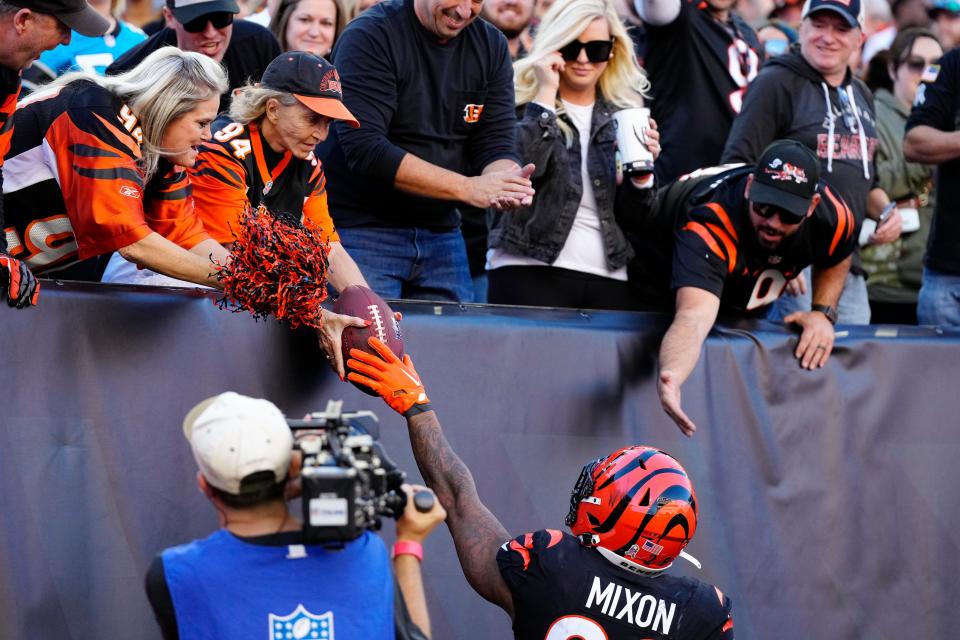Bass: ‘Dr. Fandom’ sees the good in sports fans ... and in pie
MURRAY, Ky. – Dan Wann drives us from his campus office building to a place in town for lunch. Sorry, to THE place in town for lunch, as he sees it. Oh, and I have to try the dinner roll. And I’ve got to leave room for pie. He recommends the dumplings first, because I asked. He knows this place and this area, and I trust him.
So I order what he orders. Even the “soup and dumplin’.”
“If you see me spill my soup because my hand is shaking, don’t worry,” I say, “my hand has done that all my life.”
“At least you have an excuse,” he jokes, and we laugh.
I appreciate Wann’s perspective.
In so many ways.

It is why I am here, why I recently drove more than 300 miles southwest from Cincinnati to see him. I do what I do as a sports fan coach because of what Wann has done. When it comes to sports fans, he knows this area, too.
Bengals Steelers UC Williams predictionPredictions for Cincinnati Bengals vs. Pittsburgh Steelers; UC Bearcats vs. Temple Owls
UC football Temple scouting reportNo. 25 Cincinnati football not overlooking Temple after entering CFP rankings
UC basketball first loss NKUCincinnati Bearcats basketball goes cold, suffers 1st loss of the season at NKU
Maybe better than anyone.
No wonder ESPN called him “Dr. Fandom.”
Wann is a Murray State psychology professor, and he specializes in researching sports fans. His work is among the 1,000-plus references cited in the 2019 book he co-wrote with Jeffrey James, “Sport Fans: The Psychology and Social Impact of Fandom.” It is a bible for me.
Three years ago, when I explored the idea of coaching sports fans, Wann was gracious enough to talk to me on the phone. I asked him about what fans say they struggle with ... what they want ... and what they want more of. He can’t remember anybody asking them. Marketing questions focus more on a team’s concessions, bathrooms and other at-game experiences.
“You could be like a sports psychologist for fans,” Wann said. “You can do educational sports psychology for fans.”
He was speaking in more general terms. He knew I was a coach and would approach it as one. This is exactly what I was thinking, too. I knew coaching fans would be unique, but I had no idea that these questions would be new, too.

And now here I am, three years later, meeting Wann in person for the first time, feeling like a student reconnecting with a teacher who made a difference. The work he shares with the world about sports fans helps me, to help them.
I can talk with him in a way I can’t talk with anyone else. I share with him some of my experiences. I tell him about declaring my Bengals fandom for the rest of last season, and the fallout from the gatekeepers, and how this gave me insights to help others define fandom their own way.
Wann gets it.
I tell him about how the Castellinis incensed Reds fans, from Phil’s “Where are you going to go” to Bob’s lack of transparency and accountability about the team. I tell him how a little empathy and communication can mean so much to fans, until the team wins again. I say Cubs fans craved that from their owner, too, after Tom Ricketts cited “biblical” MLB losses, deconstructed his team, then joined a bid to buy Chelsea soccer for billions.
Wann gets it.
Like me, he was a fan first. We knew what it was like to follow a losing team. The same one, coincidentally.
He is from Kansas, I am from Chicago, and we both grew up Cubs fans in the late 1960s – although he did it to taunt his older brother, a fan of the rival St. Louis Cardinals like their dad, who had been raised in southeast Missouri. Wann says so in his book, to help explain the team identification and socialization of fans. The human touch is a spoonful of sugar to help the academic-speak go down.
Wann is engaging. And candid. The book clearly states that the study of sports fans is a relatively modern pursuit, and it is hard to conclude too much from isolated studies or articles. I looked into some of those. He was spot on.
I tell him at lunch I get it now, and that I can imagine how awkward it must be when everyone wants a sound bite from him about fandom, but the answer is not that simple. He says one time he could feel his discomfort as the words were coming out of his mouth.
Yet, he believes sports fandom to the overwhelming majority is a positive, and I agree. The connection to the team and its fan community can be powerful, like family. Most fans do not turn violent over fandom. But our degree of connection can affect how we think, feel and behave. Wann researches this sort of thing.
The stress of the game and the pain of losing can get to us more than we’d like. So can dealing with time, money, balance, other fans, relationships, team decisions and so much more. I help with his sort of thing, not to make anyone a better fan, but to enhance the experience, so we can keep our passion without losing ourselves.
We don’t have to be perfect.
When Dan and a woman who used to sit right behind him at Murray State basketball games first started texting, she asked him if he liked NASCAR. In a 2020 radio interview, he said he responded, “No, I like sports.” He tells me now that he also joked about what NASCAR stands for. And the response was ... silence. “You think I’d know better,” he says now, knowing a just-kidding text didn’t cut it.
Michelle got back at him. She was an Ohio State graduate and liked Buckeyes football, but he hated it, and so when they went on an actual date, a walk around campus, she showed up wearing an Ohio State championship hoodie.
Dan and Michelle have been married for five years now, and Dan even grew to enjoy Ohio State football, too. Life sometimes works out that way.
As serious as Dan Wann is about what he does, he clearly tries not to take himself too seriously. I appreciate that about him. For two hours, we talk and laugh and enjoy the food, and I am glad I followed his lead. Again.
When he drops me off at campus, I thank him for lunch and tell him that he and his work helped inspire me to do what I am doing, and that I could not do all the things I do without him. He thanks me and seems genuinely touched.
That is why I trust Dan Wann.
This article originally appeared on Cincinnati Enquirer: Mike Bass column on sports psychologist and his work

